by Paul Eggleton (@thePEggleton), Head of Smart Metering, Telefonica UK @o2m2m)
It’s de rigueur these days when talking about the future to paint pictures of smart cities and smart homes where everything talks to everything else to provide a more efficient and environmentally sustainable society.
It’s a vision very much shared by Telefónica Digital… but these smart cities won’t be built overnight; we need to think about the underlying infrastructure in a smart way. A great first step on this journey to achieving that vision is smart metering.
In the short term, these will let consumers see exactly how much energy they’re using at any time, encouraging you to wait until the washing is done before putting on the dishwasher or to turn the lights off when you’re out of the room. The next step, with smart appliances, is that the heating will come on when your phone automatically sends it a signal saying you’re 20 minutes from the house on the way back from work. Your washing machine will even know when electricity is at its cheapest and choose to do its cycle then; eventually you’ll actually be able to sell back unused energy to your supplier.
At a macro level, it also means we can better manage Britain’s energy future by managing demand, paving the way for more efficient, low carbon generation and distribution and reducing our country’s reliance on overseas oil, gas and coal.
Luckily, on the journey to get to the smart city of the future, we’re already well on the way:
- Over 65% of phones sold now are smartphones, and we are becoming more used to engaging with all manner of products, services and “things” over our mobile devices.
- “The internet of things” has already arrived.
- Convergence between people and machines is gathering pace, and while there’s a need to be cautious and consider the security and privacy considerations, there are some very real social and economic benefits from embracing this as we become better connected.
Smart metering is a natural next step but what do we need to do to ensure they can successfully become the foundation of the smart cities of the future? There are four key areas that we need to focus on:
1. We need to develop a Future Facing Infrastructure: with the UK Government investing several billion pounds it must be fit for purpose but also flexible, scalable, interoperable and capable of fulfilling more than our immediate requirements. We must think beyond mere meter reading to the new products and services smart meters will enable to benefit the real customer or home owner experience.
2. The solution developed must be Trusted & Secure: Security by design will be inherent within the infrastructure built. To supplement this we must have an open and transparent dialogue with consumers about how their data will and can be used with their permission. Let us also not forget the installer must be trained and trusted too. Centralised certification of meters should add confidence and reduce the need for second or repeat visits.
3. Consumer Engagement is key: We need to demonstrate to all consumers what the benefits of smart metering are today in addition to what the future vision is and the new benefits this will bring with it. How do we actually make consumers want a smart meter? To many it may seem a bit like ‘tomorrow’s world’ but consumers need to understand some of the broader benefits beyond accurate bills and managing their usage via a choice of In Home Displays. Most importantly we need to foster a spirit of digital inclusion and accessibility to ensure that vulnerable consumers are also able to access these benefits.
4. Developing a robust and innovative ecosystem: Partners from across the smart metering value chain need to work together to make smart metering a success for Great Britain – it will only work when every part of it works! Collaboration is key to ensure that timelines can be met and that the foundations of the infrastructure are put in place to enable a platform from which future innovation can be implemented.
If these four areas are addressed well then we will be best-positioned to deliver a smarter energy future for Britain.
![[Guest Post] Building a smart foundation for Britain’s digital future](https://en.blogthinkbig.com/wp-content/uploads/sites/5/2013/08/firefox-be-the-future.png?resize=610%2C225)

![[Guest Post] Why Smart Parking is essential to Smarter Cities](https://en.blogthinkbig.com/wp-content/uploads/sites/5/2012/11/10184671_11_low.jpg?resize=p%2Co)






